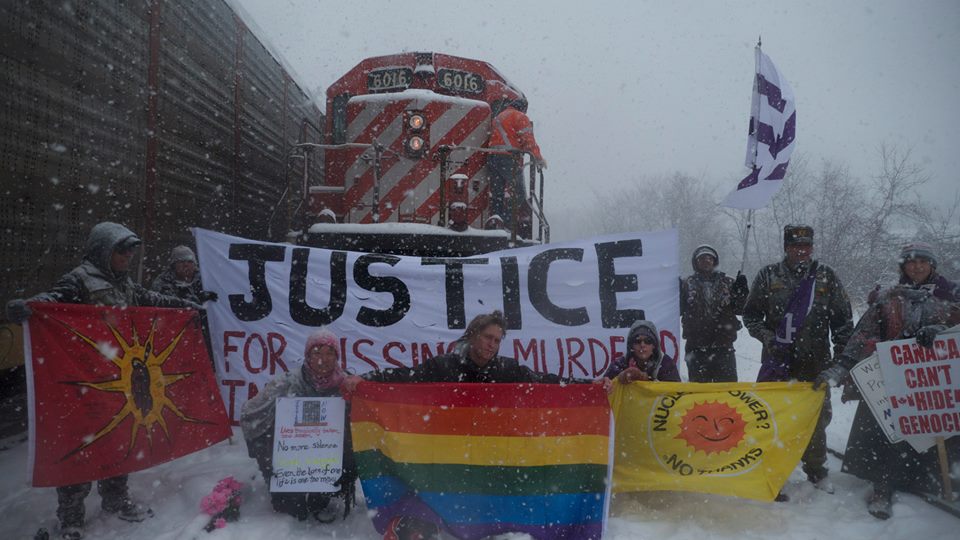In the middle of a snowstorm on Wednesday March 12, 2014, Indigenous Rights activists took over a Canadian Pacific (CP) railway line for over three hours — in solidarity with the Mohawks of Tyendinaga who also held a blockade to demand an authentic inquiry into the number of murdered and missing Indigenous women in Canada.
At the beginning of the month of March, Mohawk spokesperson, Shawn Brant, had given the Harper government an ultimatum — host a genuine inquiry into the disappearances and deaths of Indigenous women across Canada or face increasing escalations from First Nations, Metis and Innu activists until such a time as an inquiry is called.
While the federal government is insisting that it has shown its willingness to take the issue seriously — with the $25-million National Centre for Missing Persons and Unidentified Remains — activists and community members feel the lack of dedicated resources specifically for First Nations, Metis and Innu women does not address their pressing concerns.
In a report, published in September 2013 by MaryAnne Pearce and recently obtained by the Royal Canadian Mounted Police (RCMP), some 824 First Nations women have now been identified as having been murdered or gone missing, with “a majority of those cases documented as having occurred in the past 15 years.”
Shawn Brant’s Dear Harper letter states, “Your unwillingness to consider this first step at reconciliation is well documented and understood.
It is our opinion that all diplomatic means to convince you of the need for an inquiry have failed. Further, the tears and sadness of the families left behind have not moved you to any position of compassion.
We have therefore resolved that we will take whatever and further actions that are deemed necessary, to compel you to call a National Inquiry into the crisis of Murdered and Missing Aboriginal Women and Girls.”
The Mohawk blockade at the beginning of the month stopped trains for a few hours in the bitter cold. Fires burned to keep them warm.
According to Canadian National Railway (CN Rail) spokesperson, Jim Feeny, eight freight trains and four VIA passenger trains were stranded during the shutdown which lasted from 9:30 a.m. to 1 p.m. The group of roughly 70 demonstrators also maintained a presence at the side of the road away from the tracks.
In response to the rain blockade, the Ontario Provincial Police (OPP) arrested four males, including Shawn Brant and Toronto Indigenous activist, John Fox, who attended the blockade to seek justice for his daughter, Cheyenne Fox, who died in yet to be fully explained circumstances when she fell 24 stories from a Toronto condo’s balcony.
Cheyenne Fox was a member of the loon dodem from Sheguiandah First Nation in Ontario (Manitoulin Island) and is from a very politically active family. She is survived by a young son.
In fact, the Mohawks removed themselves from the railway in exchange for John Fox’s release — he was to be charged with mischief. Toronto police have stated they believe her death to be as a result of suicide, but the Fox family strongly disagrees with that assessment.
As a result of the blockade, Shawn Brant faces three charges of mischief. Two other men, Matt Doreen and Marc Baille, face charges ranging from mischief, obstruction of police to assault of a police officer. These charges have yet to be proven in court.
It has been tragic events in Toronto that have kept the spirit of justice and resistance alive through this cold winter.
Last summer, three young Indigenous females were killed in a period of three months. Organizers of the demonstration introduced the three women and acknowledged their spirits:
“Terra Gardiner was a 26-year-old Ojibwe woman from Nigigoonsiminikaaning First Nation, near Fort Frances, Ontario) whose life was taken when struck by a train on the tracks near Yonge and Summerhill on May 14, 2013. The police call her death an accident of her own misadventure, but failing to provide sufficient protective measures because she was a witness in a murder case.
Cheyenne Fox was a 20-year-old Ojibwe woman from Wikwemikong First Nation, on Manitoulin Island who fell from the 24th floor of an apartment building in Don Mills on April 25, 2013. Her death was dismissed by police as a suicide, with no further investigation.
Bella Laboucan McLean was a 25-year-old Cree woman from Sturgeon Lake First Nation in northern Alberta, who also fell from the 31st floor of an apartment building at 21 Iceboat Terrace on July 20, 2013. It took twelve hours for her ‘disappearance’ to be reported. In this case, the Police are treating this as ‘suspicious’, who as of March 14, (as far as we know) have yet to interview all witnesses.”
Activists have pledged to keep the pressure on the federal government until an authentic inquiry is called, stating that there can be no peace in Canada if there is no justice for our murdered and missing Indigenous women.
*Photo courtesy of Zach Ruiter for The Indignants. You can view the series here.




